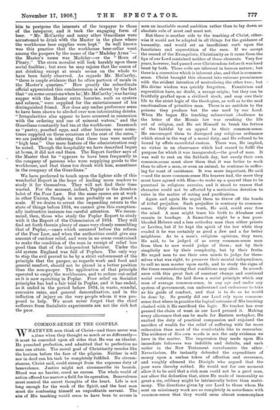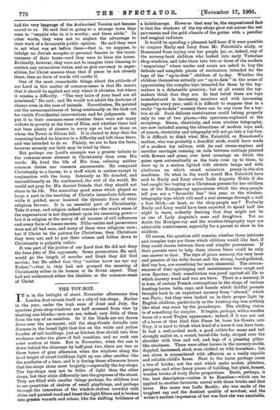COMMON-SENSE IN THE GOSPELS.
HATEVER men think of Christ—and there never was V V a.time when they thought so much or so differently— it must be conceded upon all sides that He was an idealist. He preached perfection, and admitted that to perfection no man can attain. The moral goal of Christianity recedes like the horizon before the face of the pilgrim. Neither in will nor in deed can his task be completely fulfilled. No circum- stances, Christ said, could exempt from the supreme duty of benevolence. Justice might not circumscribe its bounds. Blood was no barrier, creed no excuse. The whole world of action offered too narrow a field for its operation. Benevolence must control the secret thoughts of the heart. Life is not long enough for the work of the Spirit, and the best man must die confessing himself an unprofitable servant. The aim of His teaching would seem to have been to arouse in V V a.time when they thought so much or so differently— it must be conceded upon all sides that He was an idealist. He preached perfection, and admitted that to perfection no man can attain. The moral goal of Christianity recedes like the horizon before the face of the pilgrim. Neither in will nor in deed can his task be completely fulfilled. No circum- stances, Christ said, could exempt from the supreme duty of benevolence. Justice might not circumscribe its bounds. Blood was no barrier, creed no excuse. The whole world of action offered too narrow a field for its operation. Benevolence must control the secret thoughts of the heart. Life is not long enough for the work of the Spirit, and the best man must die confessing himself an unprofitable servant. The aim of His teaching would seem to have been to arouse in
men an insatiable moral ambition rather than to lay down an absolute rule of must and must not.
But there is another side to the teaching of Christ, other- wise it would not be adapted in all things for the guidance of humanity, and would set an insufficient curb upon the fanaticism and superstition of the race. If we accept the record of the Evangelists, Christianity as it came from the lips of our Lord contained neither of these elements. Very few years, however, had passed over Christendom before it was bard beset by both. These evils are inherent in human nature; but there is a corrective which is inherent also, and that is common- sense. Christ brought this element into extreme prominence with the evident intention of neutralising the other two ; but His divine wisdom was quickly forgotten. Fanaticism and superstition have, no doubt, a savage origin; but they can be fruitfully grafted upon a civilised stock, and may owe their life to the strict logic of the theologian, as well as to the mad emotionalism of primitive man. There is no antidote to •the poisons they produce but the one used by our Lord. When He began His teaching subservient obedience to the letter of the Mosaic law was crushing the life out of religion, and He set Himself to break the fetters of the faithful by an appeal to their common-sense. He encouraged them to disregard any religious ordinance which stood in the way of a moral duty, and He refused to be bound by effete sacerdotal custom. There was, He implied, no virtue in an observance which bad ceased to fulfil the purpose for which it was inaugurated,—the good of man. It was well to rest on the Sabbath day, but surely their own common-sense must show them that it was better to work than to allow a man, or even an animal, to continue in suffer- ing for want of assistance. It was more important, He said —and the more common-sense His hearers had, the more they must have agreed with Him—to make up a quarrel than to be punctual in religious exercise, and it stood to reason that character could not be affected by a meticulous devotion to rules in the matter of eating and purification.
Again and again He urged them to throw off the bonds of tribal prejudice. Such prejudice is contrary to common- sense. Only devotion to truth, He said, could ever free the mind. A man might trace his birth to Abraham and remain in bondage. A Samaritan might be a less pure- blooded Hebrew and a less orthodox man than either priests or Levites, but if he kept the spirit of the law while they evaded it he was certainly as good a Jew and a far better neighbour. As to a man's religious opinions, they were, He said, to be judged of as every common-sense man from then to now would judge of them ; not by their simplicity nor by their complexity, but by their fruits. He urged men to use their own minds to judge for them- selves what was right, to preserve their mental independence, to call no man master upon earth, and to study the signs of the times remembering that conditions may alter. In accord- ance with this great fact of constant change and continual social evolution, He laid down a social principle which any man of average common-sense, in any age and under any system of government, can understand and endeavour to take as his guide of conduct, and that is to do as he would be done by. So greatly did our Lord rely upon common- sense that where in practice the logical outcome of His teaching clashed with it He sacrificed the logic. No teacher has ever pressed the claim of want is our Lord pressed it. Making every allowance that can be made for Eastern metaphor, He exalted the duty of practical compassion and enjoined the sacrifice of wealth for the relief of suffering with far more reiteration than most of the comfortable like to remember. The evidence of His own words is not the only evidence we have in the matter. The impression they made upon His immediate followers was indelible and definite, and each writer in the New -Testament corroborates the other. Nevertheless, He instantly defended the expenditure of money upon . a useless token of affection and reverence, and roughly silenced the Disciple who argued that the poor were thereby robbed. He would mot for one moment allow it to be said that a rich man could not be a good man, nor allow the deduction that, since He made of immorality so great a sin, celibacy might be intrinsically better than matri- mony. The directions given by our Lord to those whom He sent on missionary work are so completely in accordance with common-sense that they would seem almost commonplace
had the very language of the Authorised Version not become sacred to us. He said that in going to a strange town they were to "enquire who in it is worthy ; and there abide." In other words, they were not to neglect the advantage to their work of a favourable public opinion. He said they were to eat what was set before them—that is, we suppose, to indulge no Jewish scruples or personal fancies to the incon- venience of their hosts—and they were to bless the house.
Evidently, however, they were not to imagine their blessing to contain any miraculous virtue, and so give currency to super- stition, for Christ assures them that if peace be not already there, then no form of words will confer it.
One of the most remarkable things about the attitude of our Lord in this matter of common-sense is that He insists that it should be applied not only where it obviates, but where it creates, a difficulty. "The very hairs of your head are all numbered," He said; and He would not admit the doctrine of chance even in the case of animals. Nevertheless, He pointed out the unreasonableness of being continually on the look out for visible Providential interventions and for judgments. He put it to their common-sense whether there were not many widows in poverty at the time of Elias, and whether there had not been plenty of sinners in every age as bad as those on whom the Tower in Siloam fell. It is absurd to deny that the reasoning landed its hearers in a difficulty and left them there, and was intended to do so. Plainly, we are to face the facts, however severely our faith may be tried by them.
But perhaps our Lord's example was a greater tribute to the common-sense element in Christianity than even His words. He lived the life of His time, refusing neither common duties nor common amusements. He compared Christianity to a leaven, to a stuff which is useless except in conjunction with the lump. Intensely as He dreaded, and unconditionally as He condemned, the evil of the world, He would not pray for His dearest friends that they should not share in its life. The masculine good sense which played so large a part in the teaching of Christ's immediate followers, while it guided, never lessened the dynamic force of their religious fervour. It is an essential part of Christianity. Take it away, and religion indeed remains—for man's sense of the supernatural is not dependent upon his reasoning power— but it is religion at the mercy of all manner of evil influences and every form of insane excess. Pillar-saints and persecutors were not all bad men, and many of them were religious ones ; but if Christ be the pattern for Christians, then Christians they were not, and to put their crimes and follies down to Christianity is palpably unfair.
It was part of the justice of our Lord that He did not deny the bona fides of His opponents. Some persecutors, He said, would go the length of murder and think they did God service ; but He added that they "neither know me nor my Father,"—that is, they had not grasped the meaning of Christianity either in its human or its divine aspect. They had not understood either the idealism or the common-sense of Christ.



























































 Previous page
Previous page